Receding democracy, growing cult and a nation on the move
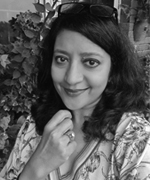 Ghazala Wahab
Ghazala Wahab
Don’t mention that you are a journalist on the Visa application form, I was advised. Just write author, else you may not get the Visa on time. Apparently, the Bangladesh government is wary of journalists, especially the foreign variety, because the local ones have suitably been trained in the art of journalism.
The import of this advice fully dawned on me after I reached Dhaka as the author of Born A Muslim: Some Truths About Islam in India to participate in two discussions on my book, my day job as editor of FORCE magazine tucked neatly under covers. A chance meeting with an academic, a gradual drift of conversation towards China led to the inadvertent emergence of the journalist from the shadows.
“How interesting that you are a journalist,” she exclaimed. “Are you able to criticize your government in India?”
The unexpectedness of the question left me speechless, and I regretted coming out of the closet. Are we able to criticize the government? I struggled to formulate the answer, even as random arrests of journalists for asking questions and for challenging the government narrative of development and peace raced through my mind. And of course, harassment through raids and defamation cases filed all over the country.
“Yes, sometimes,” I said, hoping to change the subject.
“Like, when?” she persisted.
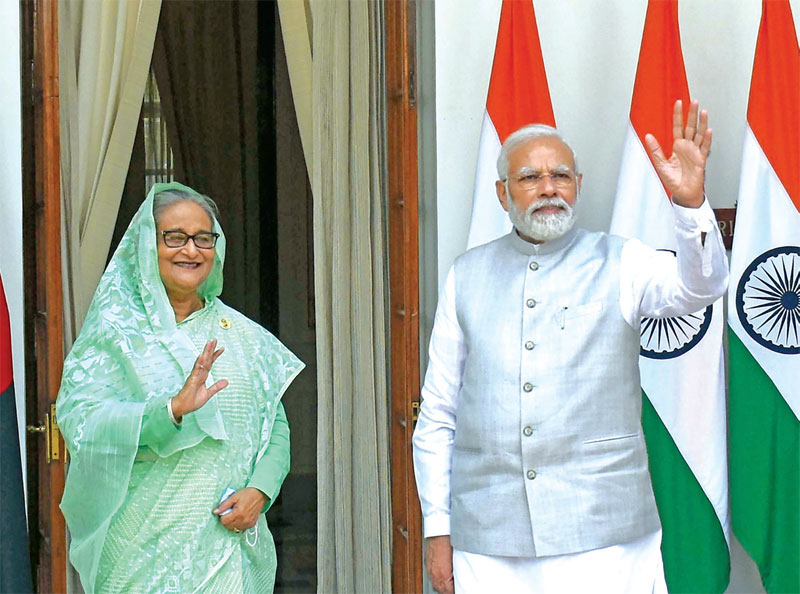
Suddenly I had clarity. “We run a small niche magazine with limited and focused readership. It is an aware and critical readership which is not waiting for our criticism to make up its mind about the government. So, the government does not bother about what we write. But if we were a mass media, able to sway opinions of those who are likely to support the government then critical writing would become difficult.”
“You are lucky that you have some space in India,” she said. “We are forced to rely on foreign-based Bangladeshi online channels for information.”
I understood the extent of what she was saying when I came across a news item in Dhaka Tribune on March 30. A Bangladeshi journalist Samsuzzaman Shams was arrested under nation’s Digital Security Act for a report challenging government’s claims on inflation. Apparently, there was some discrepancy in the photo caption and the headline, which the website removed and issued a clarification. Incidentally, Shams was a mere reporter and had nothing to do with either the headline or the caption. Yet, he was arrested and subsequently denied bail.
I was reminded of Pakistani poet Fehmida Riaz’ poem, Tum bilkul hum jaise nikle/ Ab tak kahan chhupe they bhai (You have turned out to be just like us, where were you hiding all this while brother). Seriously, when peaceniks say Indian-Pakistani-Bangladeshi are one people, they really know what they are talking about.
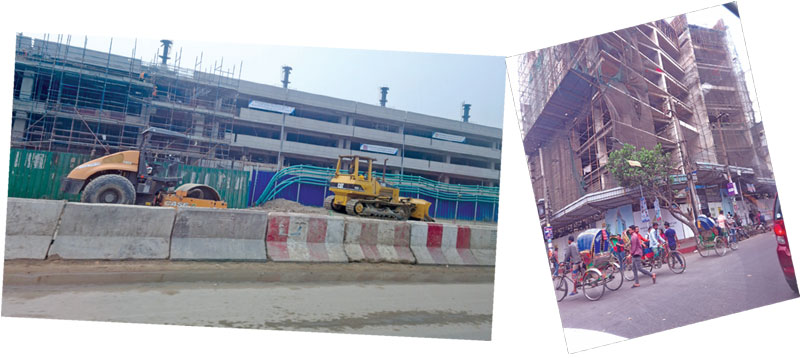
Facemasks and Construction
Despite being relatively smaller (as compared to major Indian ones), the Hazrat Shah Jalal International Airport, named after a Sufi saint, was not very chaotic. On the opposite side of the immigration counter, facing the travellers were men holding the name cards of guests they had come to receive.
I could see my name from my place in the queue. I waved vigorously at my host to assure him that his wait was nearly over. But he remained impassive and unperturbed. Looking around I realised that no one was waving at anyone. Clearly, such juvenile behaviour was not expected of the visitors, much less a female visitor. Finally, when I had the rendezvous with my name card carrying person, he remained impassive and turned away from me, walking towards the luggage belts. No words were exchanged till we reached the luggage carousels. Then he turned around and said, ‘Boarding pass.’ Deciding to go with the flow, I dutifully handed it to him without a question. He tore off the baggage tag and returned the pass to me. Thereafter, gesturing me to stay where I was, he plunged into the crowd around the belt, emerging a while later with my suitcase. But instead of bringing my suitcase to me, he disappeared in another direction, finally returning with a trolley.
The exit to the airport was through a long passageway with small representative offices of hotels and taxi agencies on one side. It led directly to a ramp into the parking, thereby avoiding crowding of the exit terminals. As I followed my escort, who was pushing the trolley at a leisurely pace towards the ramp, reverberations of the muezzin’s call followed me. The unhurried walk, a first for me at any airport, gave me ample time to take in the design, the state of maintenance and the people arriving in Dhaka. Most looked Bangladeshis to me, with a few Indians.
Finally, we reached the taxi, where the trolley was handed over wordlessly to the driver. By now reconciled to the silence, I moved towards the rear of the taxi, when out of the blue a young man appeared and greeted me cheerfully in English. The trolley man had disappeared. My host ushered me into the back seat, slipping into the front and issued some rapid instructions to the driver in Bangla. Curiosity got the better of me. So, once the initial polite conversation was over, I asked about the silent trolley man.
Meet and greet. That is what he was. A person like others who are employed to only receive guests inside the airport, help them with their luggage and escort them to their respective taxis. A unique phenomenon. Not sure if it happens in other countries too. It was my first time at any rate.
We had been driving for over 20 minutes, in which I had small talk on all possible subjects—the name of the airport Hazrat Shah Jalal, the popularity of Sufism as against more conservative forms of Islam, the university where I was invited, the average summer weather in Dhaka and so on. Having momentarily run out of subjects, I started to look out of the window. We were still meandering around some part of the airport, this one under-construction.
“Is a new airport wing being constructed?” I asked.
“It’s a new airport,” my host replied, gesturing to the gigantic building to the right of the road. “A China-led consortium is building it. It’s coming up very fast,” he said with a measure of pride.
Half an hour later, we finally hit some kind of expressway. But despite the appellation, the road was crowded and meandered through build-up areas with several traffic lights. Looking at the passers-by, I noticed most were masked up. I became acutely conscious of my maskless state.
“This is the first time I am travelling without a mask,” I awkwardly informed my host. “In India, we have put Covid behind us,” I said attempting a half-laugh.
My host didn’t reply.
So, I continued. “But it seems that Bangladeshis are still very disciplined about Covid. They still wear masks.”
“Oh, that’s because of the dust, not Covid,” he said, pointing out to what looked like an under-construction elevated road to the left of the car.
When I saw it, I realised that it had been following us from the airport, but because I was looking at the right where the airport was coming up, I had not noticed it.
“Is that a new highway?”
“That’s the Metro line. A Chinese company is building it. Even this is coming up very fast.” Further ahead I saw another huge building under construction. It looked like a warehouse.
“That is a transportation hub,” he said.
“Dhaka is transforming,” I said lightly. “So, this is all new Dhaka.”
“This will be old Dhaka in 10 years,” he said. “A new suburb is coming up, a little distance from here. All government and commercial business will shift there and then it will be the centre of the city.”
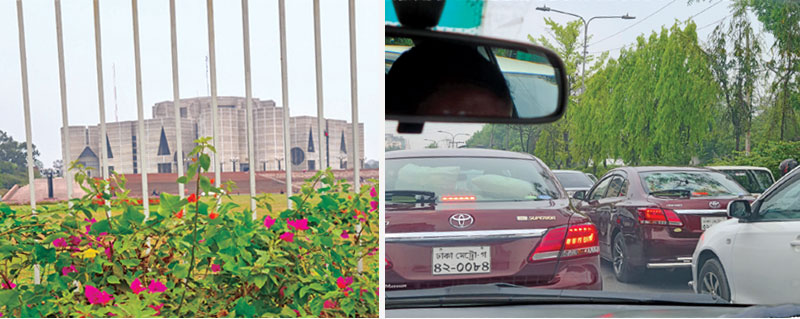
Traffic
“How much time will it take to reach,” I asked my host. It had been an hour since we left the airport. The car had been moving at a medium pace, barely breaching the 60kmph mark, with frequent hold-ups.
“Difficult to say, Ma’am. It depends upon the traffic.”
“But how many kilometres more?” I persisted.
“It doesn’t matter Ma’am, if the traffic clears up, we will reach in 15 minutes, otherwise it can take one hour more. Or even two hours.”
I noticed that not just my companions, driver included, but everyone else on the road were the epitomes of patience. Even when we were stationary for nearly 15 minutes, no one honked, no one stepped out of their cars to check what the hold-up was. Drivers just turned off the engines and waited. Indefinitely. Meditatively.
I realised I was the only person getting restless in the car every time it stopped. I wanted to know when it would start moving again, what the hold-up was, if there was a policeman to resolve it, how long would it take to resolve it…
After three days in Dhaka, I had to admit that this was a very Delhi trait. Used to measuring distance in kilometres, I just could not reconcile to measuring it in traffic. And because Bangladeshis are so used to this phenomenon, they do not pack in multiple activities in their day. They don’t believe in making pit-stops to run errands on the way to their work or appointments.
It’s better to reach early and wait then to be stuck in traffic and never reach, was the refrain I heard frequently.
During once such hold-up, which I timed at 45 minutes (I caught a short nap also), I ventured my opinion.
“Dhaka is growing very rapidly, but the infrastructure is not. There are more cars, but the roads are not wide enough…”
My companion heard me patiently. “Ma’am, even if the roads are widened, this problem will remain. Every year more people troop into Dhaka because they have lost their villages to rising water levels and floods. Last year, we had the worst floods in our living memory. Millions were displaced, some permanently. Climate change is a living reality here, not just a subject for conferences.”
In an uncanny coincidence, that evening I bumped into two British executives in the common dining room at the guest house I was staying. They worked for a Europe-based non-government organisation which worked in the area of flood prediction and management through technology. Bangladesh was one of their major programmes.
“If you drive out of Dhaka, you will notice temporary camps on both sides of the road for the internally displaced people. It is an overwhelming sight,” one of them told me.
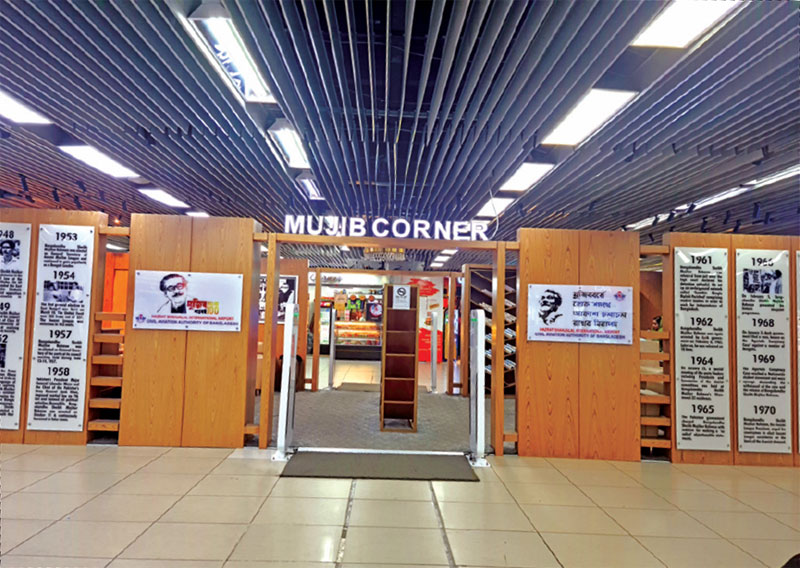
Cult of Sheikh Mujib
Coming from India, where Prime Minister Narendra Modi’s photographic presence envelopes one everywhere, I was surprised to see very few billboards with Prime Minister Sheikh Hasina’s visage. But before I could appreciate Bangladeshi leader’s modesty, I noticed something else—the myth-making and the cult of her father Sheikh Mujibur Rahman.
It’s understandable that as father of the nation Sheikh Mujib’s photograph would adorn the Bangladeshi currency, Taka. And that certain organisations, projects and government schemes would be named after him. After all, he spearheaded the campaign for the creation of his country against grave odds. But to call the nation, Mujib’s Bangladesh, instead of Bangladesh’s Mujib is like putting the man before the nation. No matter how big a person may be, shouldn’t the nation come first?
Just so nobody misses the importance of the father of the nation, the departure terminal at the Dhaka International Airport had an expansive lounge called Mujib’s corner. Correctly assessing that many people would not voluntarily enter it to get a potted history of the leader, the exterior walls of the lounge were decorated with photographic panels and detailed captions on Mujib’s life.
This was not enough. The walls around the security belts had similar photographic displays, including an image of his cortege, with the caption detailing the manner of his assassination. There were pictures of him with his family members, including daughter Hasina, the current prime minister.
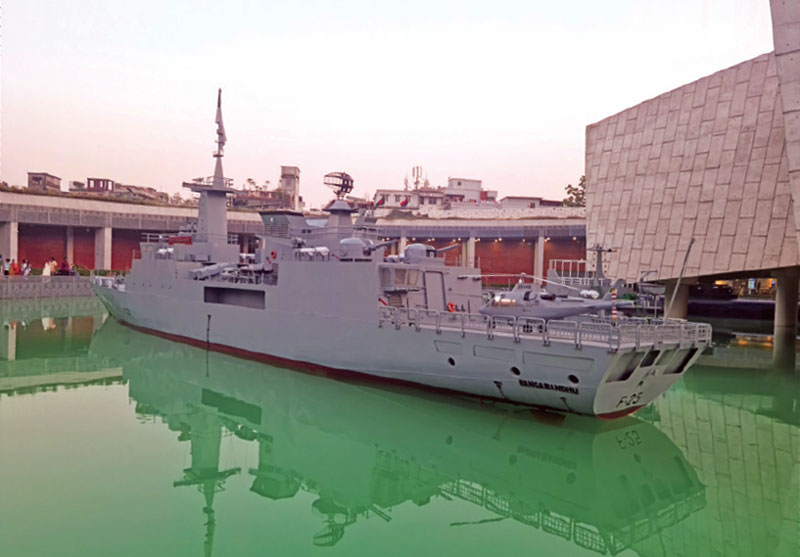
Even this was not enough. At the gates, just before one boarded the flight were illuminated panels with the outline of Mujib’s smiling face. Written alongside was ‘Mujib’s Bangladesh.’ As one waited in the queue to board the flight just short of the aero bridge, it was impossible to not keep looking at the blinking panel.
Given the political turn that Bangladesh has taken, it’s probably necessary to perpetuate the cult of Sheikh Mujib as a father in the real sense—someone who has birthed the nation, and to whom the people must remain forever beholden. This creates a justification of sorts for his daughter, Sheikh Hasina, to rule in his name, with her filiality putting her beyond criticism or accountability.
In her 14-year reign as Prime Minister, Sheikh Hasina has progressively eliminated all political opposition to her. At one point, her closest rival, widow of the former President Ziaur Rahman, Begum Khaleda Zia, was charged with corruption a few years ago and disqualified from contesting the elections. Her outfit Bangladesh Nationalist Party has been more or less decimated, with workers either jailed on some charges, or killed in political violence or simply poached and absorbed in Sheikh Hasina’s party Awami League.
Consequently, while in the 2014 elections, Awami League won 273 out of 350 seats in the Parliament, in 2018, her party won 302 seats. The party, run by former President Hussain Ershad, won the second highest number of seats, a total of 26. However, even before the elections, he had announced that his party would support the Awami League. So effectively, the ruling alliance has a total of 328 seats out of 350. A parliament without opposition.
“How can a country be called a democracy if there is no opposition,” the aforementioned academic said to me. “What do elections even mean, when in majority of constituencies the ruling party’s candidate gets 100 per cent votes? Did his opposition candidate also vote for him?”
Frissons of anxiety ran through my body. If the three offspring of Partition are indeed alike as Fehmida Riaz wrote, was I looking at our future?
Bangladesh would hold the next General Election in 2024. “I am not holding my breath,” laughed the academic.
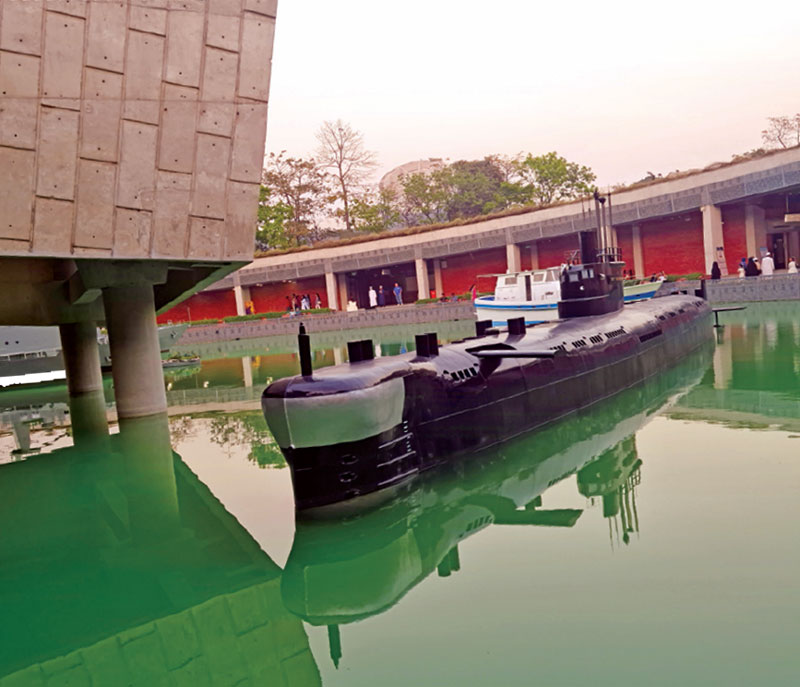
Civil Military Partnership
Designed by American architect Louis Kahn, the Bangladeshi Parliament is a stunning building. Even though from the road one does not get a good view of it, surrounded as it is by wide sprawling lawns running into acres, its unusual design is unmissable. Very close to the Parliament is another stunning building, once again surrounded by beautifully manicured and landscaped lawns.
“What’s that building?” I asked my host while we were driving into the city from the airport.
“Military museum,” he replied.
“You mean a war museum?”
“That’s different. This one is a military museum,” he said.
“Is there a war museum also?”
He turned back in his seat to look at me and smiled. “Yes, there is a military museum, a liberation war museum, an independence museum, an air force museum, a maritime museum and a police museum.”
“Why not an army museum?” I quipped.
“Because the military museum is run by the army,” he said patiently.
This was one monument I had to visit even if it meant compromising on shopping, I told my host firmly. Eventually, the time was fixed for the following afternoon.
The military museum commenced its journey in 1987 as a small war museum inside the Mirpur cantonment. A decade later, the grateful nation agreed that the military needed more space, hence the museum was shifted to the present location in the heart of the capital. In 2017, under Sheikh Hasina’s premiership, construction for the present museum began and was inaugurated by her five years later.
During my drive to the museum the following afternoon, I kept thinking why a nation needs a military museum, distinct from a war museum, when it does not have a defence industry to showcase the evolution of its equipment. I have visited a few such museums in Europe, especially in France and England. Since I did not visit the Liberation War Museum, I don’t have a comparison, but the military museum also largely commemorated the 1971 war. Of course, there were expansive galleries, both indoors and outdoors which showcased latest equipment, but all were of Chinese origin, so what was the pride in displaying them?
I finally had the clarity when I was walking alongside the large water body which displayed a model of the Ming class submarine BNS Nobojatra (Type 035G) on one side and the Ulsan class frigate BNS Bangabandhu on the other side. These displays had big crowds with visitors stopping to take pictures. While the history of war was an expression of gratitude to the military, the modern equipment was a testimony to the leadership of the prime minister who was working to make Bangladesh militarily stronger. The military museum maybe helmed by the army, but it was a product of true civil military cooperation.
“How do ordinary people regard the military?” I asked the academician later.
“It’s a complicated relationship,” she said. “The military is very big in Bangladesh. There are very few people who don’t have relatives who have either served in the military or are currently serving in it. So, there is enormous respect. But at the same time, Bangladesh is a small country. So, the real estate that the military controls, or the businesses it runs, are all in the public eye. This lowers its status as greedy and a corrupt organisation. However, the overriding sentiment for the military is fear, because the government and the military are working together to crush dissent and independent voices.”
From shaky relationship with the military in the early years of her political career, Sheikh Hasina has found a perfect balance for co-existence. In this, she has gone one better than her father. After the 1971 victory, Sheikh Mujib was both worried and wary of the military; he didn’t want it to become a power centre in itself, as happened in Pakistan. Hence to undercut it, he raised his own private militia, which had loyalty to him and his party. Jatiya Rakkhi Bahini was originally raised as a paramilitary to counter left-wing extremism, but overtime became a loyal party tool, leading to much resentment in the armed forces. As it turned out, Sheikh Mujib’s fear of the military was well-founded. He was assassinated by the army rebels.
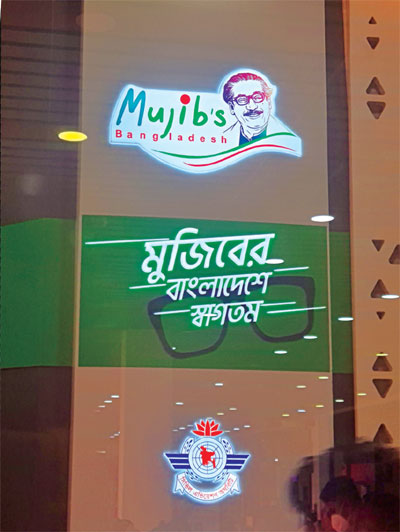
Religion and Language
“Moving around in Dhaka is very easy. You can book an Uber, or simply hail a rickshaw,” my host told me, while dropping me off to the guest house.
Encouraged, that evening, I stepped out for dinner. I didn’t have to walk much. A rickshaw was just across the street. I walked over to the rickshaw-puller and gave him the name of the restaurant I wanted to go in Hindi. He replied to me in Bangla. I tried in English. Once again, he replied in Bangla. I looked around to see if someone would translate for me. Sure enough, a bunch of what looked like teenagers emerged from the adjacent lane. I waved to them enthusiastically and asked them if they could help me. They all gave me a blank look. None spoke English. Which teenager today does not speak English!
Slowly the enormity of the challenge dawned upon me. Both the road signages and the vehicle number plates were in Bangla. Even booking an Uber would not help. I would not be able to recognise the car and wouldn’t be able to speak to the driver. Walking around was also not an option. In case I lost my way I wouldn’t be able to read the signages. And wouldn’t be able to ask anyone. I went back to the guest house and settled for a communal dinner in the dining hall.
The following afternoon, one of my hosts took me to a café for lunch. Amongst the modern places in Dhaka, serving European fare, the café was full of young people, mostly college goers. It was refreshing to see young Bangladeshi women in stylish western wear, as opposed to hijabs which I had been seeing since my arrival. Yet, everyone without exception spoke Bangla.
“It would be unusual to find young people in Delhi speaking in Hindi,” I told my host.
“Yes, here it would be unusual to find people speaking in any language other than Bangla,” he replied.
“It seems to be a bit like French a few decades ago, when even if they understood, they refused to engage in English.”
“It’s not like that at all,” he said. “Penetration of English in Bangladesh is very limited.” According to him, the nationalist movement was driven by language, hence when the country became independent, Bangla had to be given primacy over every other language. In any case, there was deep animosity towards Urdu, so there was a concerted effort to erase it completely. Besides, given the colonial history, even English was regarded with disdain. English education started only a few decades ago and remains limited to a certain section of the society.
On my return flight, I couldn’t help dwelling over my three days in Dhaka. In many ways, Bangladesh is an artificial construct based first on religion and then language. Religion estranged it from the larger Bengal, and language from fellow religionists. Whatever be his desire, in the early years of independent Bangladesh, Sheikh Mujib created an insular island with language creating a wall between the Bangladeshis and the world. Thankfully, there are multiple bridges now. One only hopes that these also carry the values of freedom and democracy into the nation. After all, we are one people. What happens there affects all of us.

